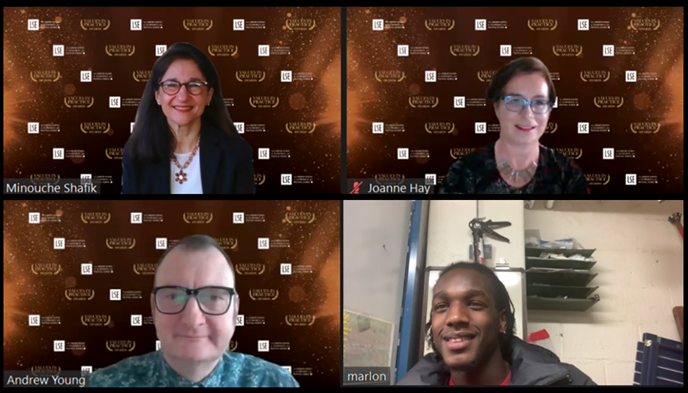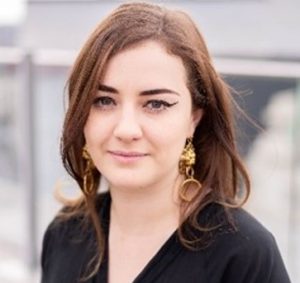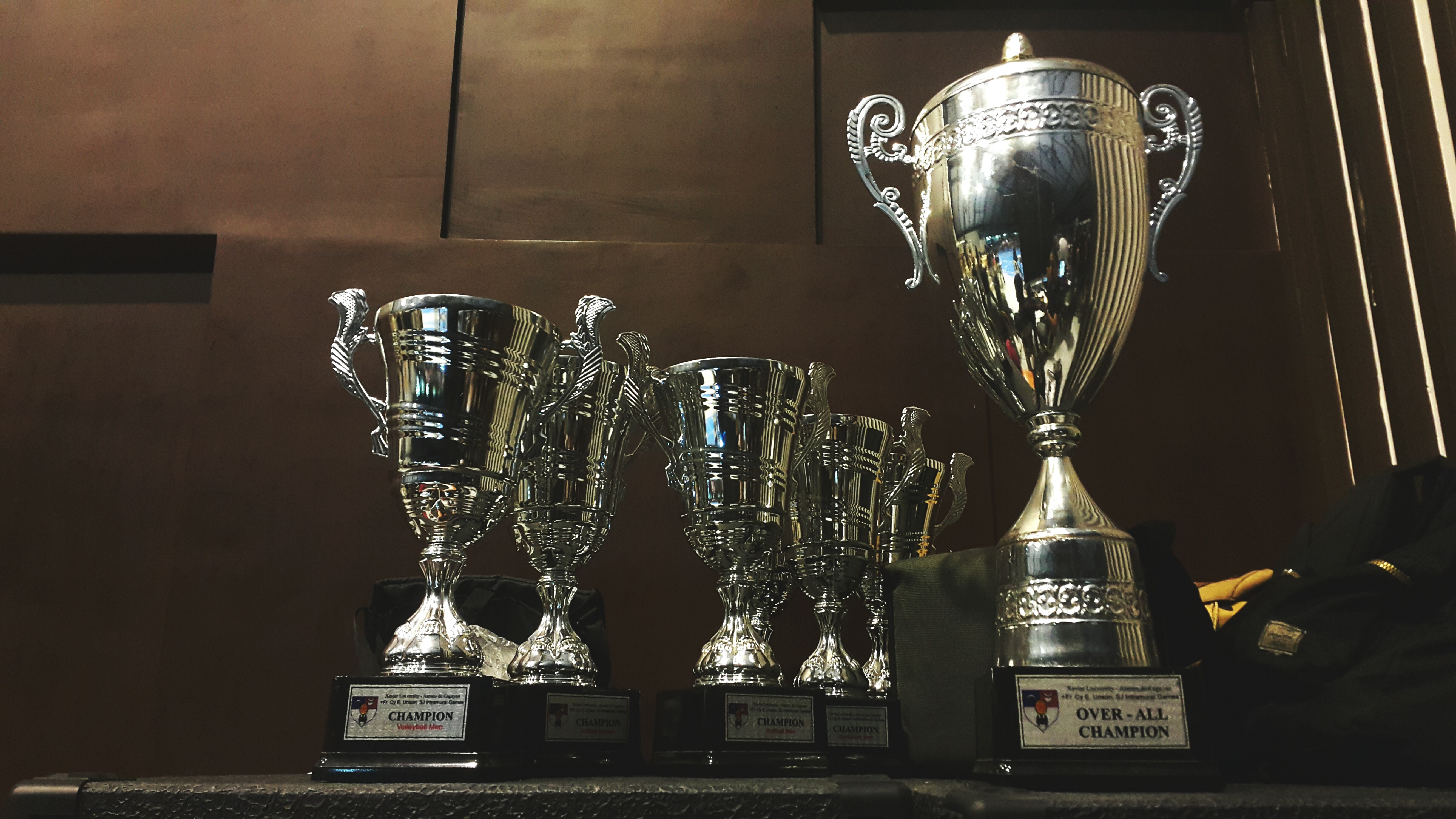The Values in Practice (ViP) Awards commends LSE’s professional services colleagues, recognising their contributions to the LSE community, especially over the pandemic. Paulette Annon speaks to six members of staff – Ikenna Acholonu, Victoria Frost, Olivia Broome, Georgios Mavridis, Marlon Kizito, and Gillian Asafu-Adjaye, some joining just as lockdown began, sharing what drives them to accomplish so much in such difficult circumstances. But first, Joanne Hay and Andrew Young explain the origin and the aim of the awards.
 LSE ViP Awards 2021
LSE ViP Awards 2021
The past 18 months have been incredibly challenging, arguably some of the most demanding in LSE’s 125-year history. However, across the school, colleagues have responded with creativity, agility, perseverance, and good grace, and the school is a more closely-knit community through our shared experiences. While our academic colleagues receive recognition for their research and teaching, and rightly so; the efforts of professional services (PS) staff, who often work behind the scenes, go unacknowledged. The Values in Practice (ViP) awards were set up to celebrate and recognise the immense contribution that professional services staff make to LSE.
The scheme was launched in 2016 and has run annually since. Nominations have risen steadily year on year, with a record 859 nominations in 2020 – in the midst of the pandemic. There is a sense that, as a community, we have become more collaborative, responsive, and willing to support those around the school. This was very evident at the ViP awards ceremony this year, which really did have the feel of the Oscars about them! It was noted that every winner (commended, runner up, or outright winner) credited others. They were pleased to have been recognised and grateful for the support around them.
– Joanne Hay, Deputy Chief Operating Officer and Andrew Young, Chief Operating Officer
What we do matters. It’s important to me to keep going, to put in the hours and the effort, to make sure that students have as much help as possible to make it through this incredibly tough time.
Victoria Frost

Ikenna Acholonu
Africa Engagement Programme Manager, Firoz Lalji Centre for Africa; Co-chair, EmbRace
Winner of the EDI award
What was the most significant way in which your role changed over this period?
As Engagement Programme Manager of the Africa Centre, I, along with members of my team, were scheduled to visit Nigeria, Ghana and South Africa in the summer of 2020 as part of our annual alumni engagement tour. But this was abruptly halted due to lockdown. As a result, we pivoted online, and I began hosting online events for our African alumni, prospective students, and offer holders. By the end of the year, I had clocked up one-on-one meetings with more than 100 alumni!
Another significant change was being appointed co-chair of LSE EmbRace in February 2021. With LSE EmbRace, we work to ensure that the BAME community at LSE has a seat at the table, where big decisions are being made across the school. The Black Lives Matter movement in the summer of 2020, which made violence against Black people more globally visible, led to further, and more critical, conversations on institutionalised racism and decolonisation.
What would you see as your most significant achievement?
I contributed to a series of blog posts on the Africa LSE blog, which focussed on pathways to success for students in African higher education. Making sure that these students were well-informed with all the resources and opportunities they needed is something I’m really passionate about. As a result, a lot of alumni commented on the usefulness of the series in being able to create a network of support to African students.
I was very humbled to receive the EDI Champion Award at the Values in Practice Awards, because I know that there are so many colleagues who are also doing amazing work to try to advance equity, diversity, and inclusion within LSE.
What has been your source of motivation during the pandemic?
First and foremost, my huge family! Not being able to see some of them has been difficult for me, but regular Zoom calls, talking about how life and work was, kept me happy, focused, and sane! The second biggest source of motivation for me is the LSE community. Through EmbRace and the Firoz Lalji Centre for Africa, I’ve been able to feel part of a community at LSE, something I hadn’t experienced since I moved to London four years ago. Throughout the pandemic, I connected with a lot of colleagues, academics, and students who kept me going enabling me to support them in their career and educational paths.

Victoria Frost
Deputy Head of Student Services –
Wellbeing
Winner of the Inspirational Leadership award
What was the most significant way in which your role changed over this period?
During the pandemic my role changed tremendously in the way I spent my time, although the purpose of my role didn’t change at all. As the Head of Residential Life, my role is about supporting students to thrive while at LSE. This involves helping them settle in, be safe, and make the most of their time with us through activities. I’ve still spent the past year doing that, but the focus has absolutely been on the middle part (being safe), whereas that’s normally a much smaller part of the role. I actually moved into halls for the first lockdown – that was a pretty big change!
We had our first suspected COVID case in halls in January 2020, so I spent the past 15 months emmeshed in our pandemic response. We created policies and processes for students and staff, developed risk assessments for our activities, and worked with teams across the school and in the local community to make sure we were as responsive as we possibly could be. I now know more about COVID-19 than I ever wanted to know, but it has really helped in how we responded to support our students.
What would you see as your most significant achievement?
Honestly, what I am most proud of is that we kept going. We made it through the end of last year and this year as a team. We dealt with what came up, we worked incredibly hard, through incredibly difficult (and uncertain, or often changing) times. I am very honoured to have been nominated (and to have won) a VIP award, and hope that it reflects on the wider Residences team.
What has been your source of motivation during the pandemic?
In my many years of working at universities, I’ve dealt with my share of crises, and what motivates me through those is the knowledge that, as an institution, we have the power to make a huge impact on a student’s progression and success. What we do matters. It’s important to me to keep going, to put in the hours and the effort, to make sure that students have as much help as possible to make it through this incredibly tough time.
One small thing that kept me motivated is a small list I made early in the first lockdown, that has been stuck to the wall of every desk I’ve worked in over the past year (Grosvenor House, High Holborn, Bankside House, my home, and the office!) It’s travelled with me to remind me to focus on what I can do, and keep in mind what’s important, thereby, giving myself permission to know that some things are going to slip, or not be as perfect as I’d like them to be, and that is okay. That’s kept me motivated in helping me not to feel too overwhelmed.
 Victoria Frost's reminder of what's important
Victoria Frost's reminder of what's important
From the 15-minute daily check-ins with my team, to the Monday-night Teams quizzes ... it has been such a lifeline to stay connected to the people I miss
Olivia Broome

Olivia Broome
Staff Communications Manager
Winner of the Outstanding Collegiality Award
What was the most significant way in which your role changed over this period?
Working in the Internal Communications team before, and during the pandemic meant our workload as a team increased dramatically. Our community was looking to us for regular updates on government changes as they happened. We had to drop most of our proactive work and be solely reactive for months. However, we received a lot of positive feedback about how valuable our communications have been – so it was worth the effort. Now that things are easing slightly, it’s nice to be able to come back to projects we’ve dropped and focus on how we’re going to communicate about new changes.
What would you see as your most significant achievement?
I’ve gone through some significant life changes over the past year – and apart from just managing to carry on with my job from home, I think I’m proud to have completed a short course offered at LSE – Business, International Relations, and the Political Economy. It was only eight weeks, but writing short essays each week and taking notes was intense – and reminded me that doing a Master’s would be even harder! I’m grateful for the chance to learn and progress in a year when so many people have struggled with job loss and furlough.
What has been your source of motivation during the pandemic?
My colleagues, my team, and my friends. From the 15-minute daily check-ins with my team, to the Monday-night Teams quizzes (which are still going strong!), it has been such a lifeline to stay connected to the people I miss. I loved coming into the office because of the people in my division, and I can’t wait for everyone to start returning. We have a lot of snack table chat, legal hugs, and karaoke bookings to make up for!

Georgios Mavridis
Service Desk Manager, Data and Technology Services (DTS)
Commended for Inspirational Leader and Excellent Manager awards
What was the most significant way in which your role changed over this period?
I started at LSE two weeks before we went into lockdown in March 2020, so started working from home almost immediately. Usually, when you start a new job, the first few weeks are all about getting to know your team and colleagues and learning about the organisation. I had to fast-track everything as my team took a key role in assisting with the transition to work remotely. We were assisting users in getting familiar with how to access key resources from home and troubleshooting any issues they had. As you can imagine, it has been a very busy period and quite challenging. The team had never worked from home, so we were all new to it. Working from home can be difficult and isolating at times, but I never felt alone as my team and manager were always there for me.
What would you see as your most significant achievement?
The most significant achievement for me over the past year was the increase in ticket resolution and reduction in waiting times for our customers. Despite the challenges and difficulties we all had to face over the past year, I am proud to say that my team and I were able to assist our users and the LSE community. Covid-19 caused a major shift in just about every aspect of our lives. One area was the expectations of technology and how it should be delivered. Behind the technology, there are real people – like you and me – working their hardest to meet reasonable requests and keep customers happy. We may not always get it right, but we will try our best.
What has been your source of motivation during the pandemic?
My friends and family – I must have spent hours and hours on Zoom meetings with them. Professionally speaking, my team has truly been amazing and the source of my motivation. We support and help each other, and more importantly, we are always there for each other. Teamwork makes the dream work!
perceptions of us being just ‘handy people’ are changing ... my team has shown that we have got stuck in and have effectively handled a range of issues, and continue to do so, because our work has to go on
Marlon Kizito

Marlon Kizito
Building Fabric Technician, Estates Department
Winner of the Team of the Year Award
What was the most significant way in which your role changed over this period?
Based on campus, we maintain over 30 buildings, but furlough cut the Estates team in half, so staff who were maintaining halls of residences were no longer onsite, and we absorbed their work, which was a mixture of planned jobs as well as reactive calls. We had a reduced scale of working, in which the work pattern then changed to working one week on, one week off. One of the major challenges we faced was the reduction in water in some of unoccupied buildings creating a build-up of Legionella bacteria, which required specialist, additional teams to address, to minimise a potential outbreak.
What would you see as your most significant achievement?
Being able to move around different teams and meeting different people really improved my skills in communication and team-working. I was working in unfamiliar situations, where every day gave me a new environment, a new way to adapt, and an opportunity to improvise on my working style. I love that about my job, even the crazy random jobs like freeing a trapped pigeon!
What has been your source of motivation during the pandemic?
Our department has had to take on additional responsibilities, and we don’t always get recognised for our efforts. But being nominated for and awarded the Winning Team of the Year shows us that perceptions of us being just ‘handy people’ are changing. My team has shown that we have got stuck in and have effectively handled a range of issues, and continue to do so, because our work has to go on.
On a personal level, I have really come to value work as my space to escape, at a time where many people have had to deal with a lot of different issues affecting their physical, mental and financial health. I have been very lucky that I have been able to get out and come into work, have a routine, and keep going, despite the challenges and safety concerns. In addition to my work, this period has made me value my own physical and mental health more, and my boxing training, and training younger members of my local community which has been invaluable in maintaining a healthy mind and body.

Gillian Asafu-Adjaye
Programme Officer, Firoz Lalji Centre for Africa
Commended for Student Experience Ambassador award
What was the most significant way in which your role changed over this period?
I actually started this role in May 2020, so being commended for a job I had been in less than a year is an incredible honour! I came to this role with experience of doing online events, and those skills became very important when interacting with students on the Programme for African Leadership, through online games, activities, and socials. But even with those skills, like many, I had to pick things up as I went along, like using Zoom. My team has a ‘let’s get this done’ attitude and we did! It was important, though, to keep in mind that we were working with students based abroad, some who had limited opportunities to leave their homes or have other people around them, so their mental wellbeing was a big concern for all of us.
What would you see as your most significant achievement?
Something I won’t forget was organising the online graduation for our programme at the end of June. Prior to lockdown, this was something the students were really looking forward to. The first challenge was sourcing an alternative provider for the student’s certificates as the one we used previously had closed due to the pandemic. I also had to consider what the event would look like, so I recruited colleagues and members of the programme team to participate in a Tik-Tok-style video compilation, and I found a powerful poem to be read by members of the student body, which closed the event. Students, their families and staff had an opportunity to really come together and celebrate. I wrote a piece for the Africa at LSE blog, commemorating the occasion. It was great being instrumental in putting all of that together.
What has been your source of motivation during the pandemic?
Feeling blessed enough to be in the career that I want to be in has certainly helped! Contributing to our student journey, particularly through the pandemic, is an integral part of my role, and having someone thank you for all that you were doing in the current environment, has also been a motivational factor. I put on a number of online games afternoons for our students, and one of them emailed to say thank you for organising it, adding that it was nice to have somewhere to take a break and connect with other people, often a difficulty in an online learning space.
Also motivating was the creation of an open space for staff and students to discuss issues on race in view of the growing BLM movement last summer. Though the road to change is a slow one, I feel there’s so much more hope and motivation, and it comes from the students and from the conversations.
____________________________________________________________________________________________
This post is opinion-based and does not reflect the views of the London School of Economics and Political Science or any of its constituent departments and divisions.
____________________________________________________________________________________________





